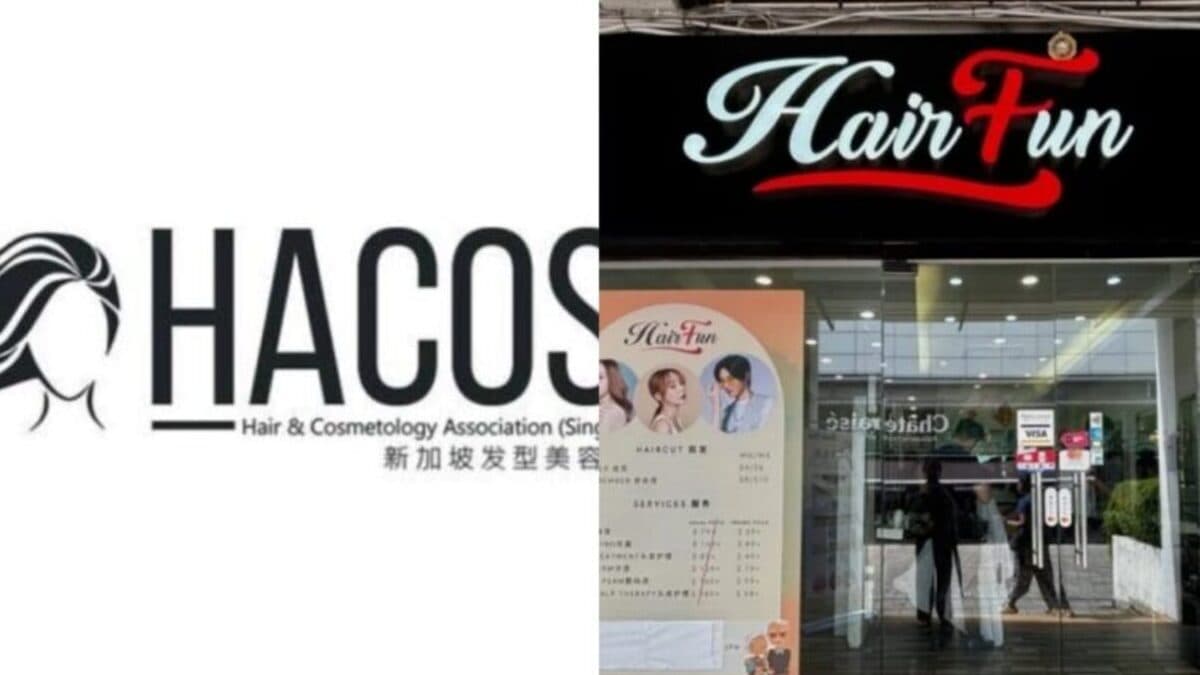Hair industry group calls for regulation as complaints surge to CASE’s top 10 list
The Hair and Cosmetology Association of Singapore (HACOS) is urging the government to introduce stronger regulation and mandatory competency standards after hair salons entered the Consumers Association of Singapore’s (CASE) top-10 most complained-about sectors for the first half of 2025.

- CASE recorded 167 complaints against hair salons in the first six months of 2025, ranking the sector ninth overall.
- Common issues include high-pressure sales tactics, hidden charges, and poor service.
- HACOS says the lack of mandatory licensing and training is fuelling inconsistent service and consumer mistrust.
SINGAPORE: The Hair and Cosmetology Association of Singapore (HACOS) has called for stronger regulation of the hair industry after hair salons entered the Consumers Association of Singapore’s (CASE) top-10 list of most complained-about sectors for the first half of this year, with 167 complaints.
HACOS, which represents more than 300 members across the beauty, hair, makeup, and nails industries, said increased oversight and minimum competency standards are necessary to raise professionalism and protect consumers.
According to CASE figures released on 5 August, complaints against hair salons rose to the ninth-highest among all industries between January and June, surpassing airlines, which placed tenth.
CASE president Melvin Yong noted that the number of complaints in the first half of 2025 was slightly lower than the 170 recorded in the same period last year.
Losses from prepayments were also significantly reduced, totalling S$5,619 (US$4,386) compared with S$21,810 in 2024.
Yong said complaints largely concerned high-pressure sales tactics, misleading or false claims, hidden charges for add-ons, and poor service.
Complaints against salons
Allegations of aggressive upselling and excessive charges have long plagued the hair industry, with some customers billed for services they had not agreed to.
In June, the HairFun chain of salons admitted to unfair trade practices targeting elderly clients.
The salons had offered free or low-cost haircuts but misled seniors into purchasing expensive services and packages.
In one case, an elderly man who went in for an S$8 haircut was charged nearly S$1,000 for a treatment package he had not consented to.
HairFun has since pledged to end such practices, cooperate with CASE to resolve complaints, and provide a five-day cooling-off period for refunds on prepaid packages.
Many consumers have shared their dissatisfaction with salons on social media.
On Facebook, a man recounted in February that a stylist gave him an uneven haircut despite instructions to only trim and tidy his hair.
Another user shared in March that a salon owner ruined their haircut because she was chatting with others during the session. The owner then refused to apologise and even barred the customer from returning.
Another customer, Yeo Z G, 41, said a salon gave his 70-year-old mother an uneven haircut and treated her coldly after she declined to sign up for a membership or purchase add-ons.
A Reddit user also described being pressured to pay more for basic haircuts despite already holding a discounted membership, which became invalid after refusing renewal.
Calls for mandatory standards
HACOS founder Simon Lee, a trained hairdresser, said complaints often stem from hard-sold packages, inconsistent service, and unqualified practitioners.
He pointed out that Singapore has no licensing requirements for hairdressers, unlike countries such as Australia, the UK, the US, Korea, and Japan, where hairstylists must meet training or certification standards before practising.
“As a result, there is no standardised skills framework to ensure that all hairdressers meet minimum levels of entry with proper hair education, training or competency,” said Lee.
He warned that the absence of regulation contributes to safety risks and erodes public confidence, adding that the sector’s re-entry into CASE’s top-10 complaint list could be tied to a rise in budget salons using cheap or free cuts as bait for aggressive upselling.
Lee urged authorities to consider phased regulation, beginning with a registry of certified professionals and a competency-based licensing system.
“Regulation of the hair industry is not only possible but increasingly desirable for the long-term health of both the industry and the nation, as well as for the protection of consumers,” he said.







